Jeep Compass vs VW T-Cross – Which car suits you better?
Compare performance, boot capacity, efficiency and price at a glance.
Find out which car is the better choice for you – Jeep Compass or VW T-Cross?
Costs and Efficiency:
Looking at overall running costs, both models reveal some interesting differences in everyday economy.
VW T-Cross has a convincingly advantage in terms of price – it starts at 21100 £, while the Jeep Compass costs 34200 £. That’s a price difference of around 13123 £.
Fuel consumption also shows a difference: VW T-Cross manages with 5.40 L and is therefore minimal more efficient than the Jeep Compass with 5.80 L. The difference is about 0.40 L per 100 km.
Engine and Performance:
Power, torque and acceleration say a lot about how a car feels on the road. This is where you see which model delivers more driving dynamics.
When it comes to engine power, the Jeep Compass has a distinct edge – offering 213 HP compared to 150 HP. That’s roughly 63 HP more horsepower.
In acceleration from 0 to 100 km/h, the VW T-Cross is minimal quicker – completing the sprint in 8.40 s, while the Jeep Compass takes 8.50 s. That’s about 0.10 s faster.
In terms of top speed, the VW T-Cross performs barely noticeable better – reaching 200 km/h, while the Jeep Compass tops out at 188 km/h. The difference is around 12 km/h.
There’s also a difference in torque: Jeep Compass pulls clearly perceptible stronger with 345 Nm compared to 250 Nm. That’s about 95 Nm difference.
Space and Everyday Use:
Whether family car or daily driver – which one offers more room, flexibility and comfort?
Both vehicles offer seating for 5 people.
In curb weight, VW T-Cross is noticeable lighter – 1267 kg compared to 1667 kg. The difference is around 400 kg.
In terms of boot space, the Jeep Compass offers slightly more room – 550 L compared to 455 L. That’s a difference of about 95 L.
In maximum load capacity, the Jeep Compass performs slightly better – up to 1561 L, which is about 280 L more than the VW T-Cross.
Who wins the race?
The Jeep Compass proves to be edges ahead and therefore becomes our DriveDuel Champion!
Jeep Compass is the better all-rounder in this comparison.
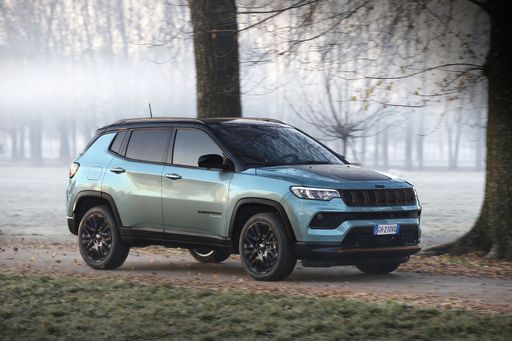 @ Jeep / Stellantis Media
@ Jeep / Stellantis Media
Jeep Compass
Jeep Compass
The Jeep Compass packs classic Jeep styling with a surprisingly composed demeanor, equally at home turning heads in the city or tackling a weekend dirt track. Inside it's a pragmatic, user-friendly compact SUV that prioritizes comfort and versatility — a smart pick if you want a dose of adventure without giving up everyday sense.
details @ Jeep / Stellantis Media
@ Jeep / Stellantis Media
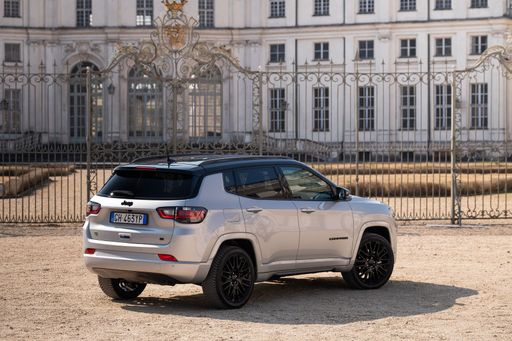 @ Jeep / Stellantis Media
@ Jeep / Stellantis Media
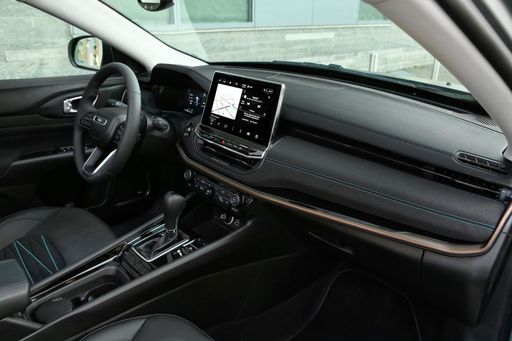 @ Jeep / Stellantis Media
@ Jeep / Stellantis Media
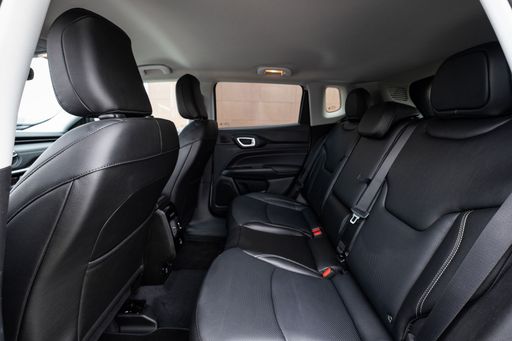 @ Jeep / Stellantis Media
@ Jeep / Stellantis Media
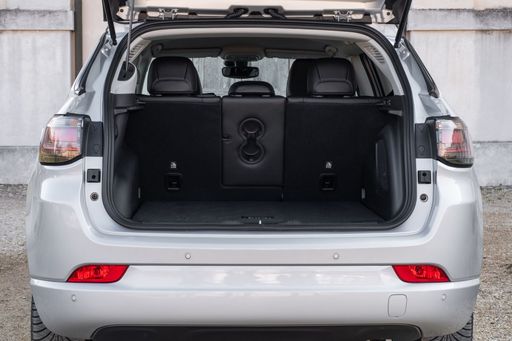 @ Jeep / Stellantis Media
@ Jeep / Stellantis Media
VW T-Cross
The VW T-Cross turns everyday practicality into a style statement, offering a roomy-feeling cabin, clever storage and playful design that suits town life and family duties alike. On the road it's composed and relaxed, rewarding buyers who want the raised seating and confident presence of an SUV without the weighty compromises.
details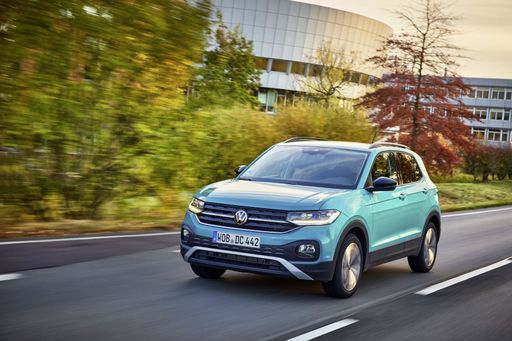 @ Volkswagen AG / VW Media
@ Volkswagen AG / VW Media
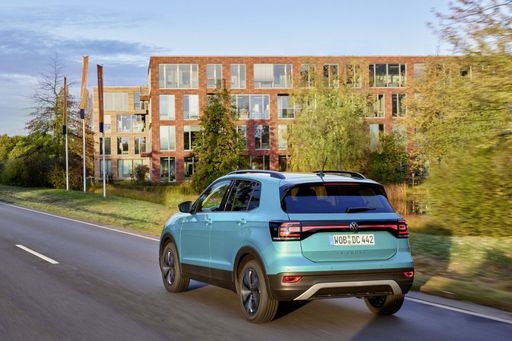 @ Volkswagen AG / VW Media
@ Volkswagen AG / VW Media
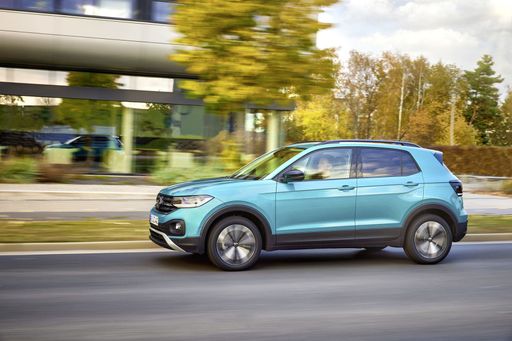 @ Volkswagen AG / VW Media
@ Volkswagen AG / VW Media
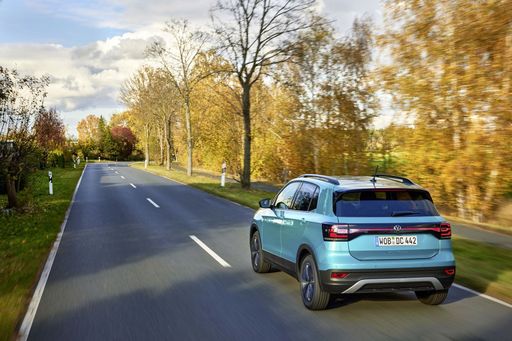 @ Volkswagen AG / VW Media
@ Volkswagen AG / VW Media
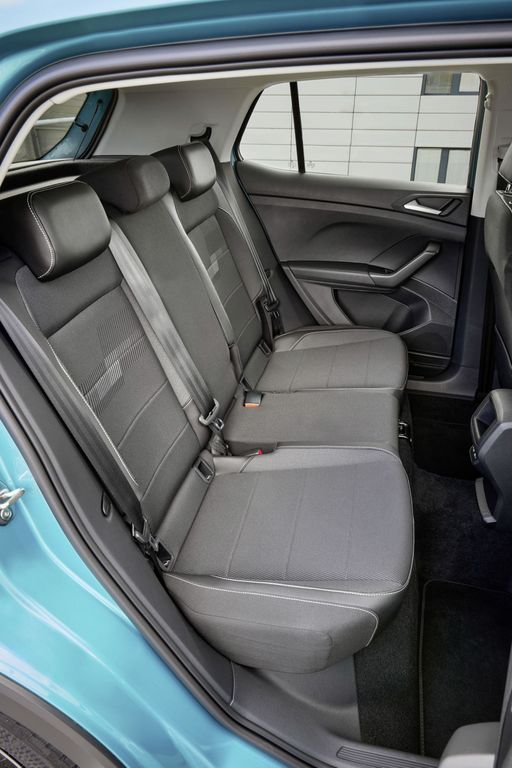 @ Volkswagen AG / VW Media
@ Volkswagen AG / VW Media
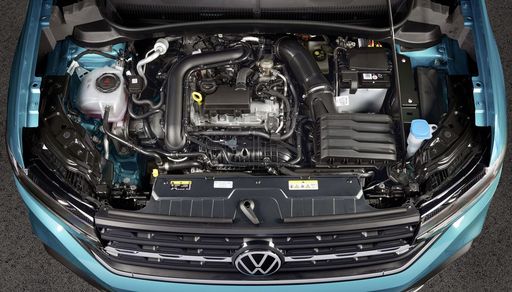 @ Volkswagen AG / VW Media
@ Volkswagen AG / VW Media
 @ Jeep / Stellantis Media
@ Jeep / Stellantis Media
|
 @ Volkswagen AG / VW Media
@ Volkswagen AG / VW Media
|
|
|
|
Costs and Consumption |
|
|---|---|
|
Price
34200 - 43200 £
|
Price
21100 - 31500 £
|
|
Consumption L/100km
5.8 - 5.9 L
|
Consumption L/100km
5.4 - 6 L
|
|
Consumption kWh/100km
17.50 kWh
|
Consumption kWh/100km
-
|
|
Electric Range
500 km
|
Electric Range
-
|
|
Battery Capacity
74 kWh
|
Battery Capacity
-
|
|
co2
0 - 133 g/km
|
co2
124 - 136 g/km
|
|
Fuel tank capacity
55 L
|
Fuel tank capacity
40 L
|
Dimensions and Body |
|
|---|---|
|
Body Type
SUV
|
Body Type
SUV
|
|
Seats
5
|
Seats
5
|
|
Doors
5
|
Doors
5
|
|
Curb weight
1667 - 2198 kg
|
Curb weight
1267 - 1338 kg
|
|
Trunk capacity
550 L
|
Trunk capacity
455 L
|
|
Length
4552 mm
|
Length
4127 mm
|
|
Width
1928 mm
|
Width
1784 mm
|
|
Height
1675 mm
|
Height
1573 mm
|
|
Max trunk capacity
1561 L
|
Max trunk capacity
1281 L
|
|
Payload
-
|
Payload
463 - 480 kg
|
Engine and Performance |
|
|---|---|
|
Engine Type
Petrol MHEV, Electric
|
Engine Type
Petrol
|
|
Transmission
Automatic
|
Transmission
Manuel, Automatic
|
|
Transmission Detail
Dual-Clutch Automatic, Reduction Gearbox
|
Transmission Detail
Manual Gearbox, Dual-Clutch Automatic
|
|
Drive Type
Front-Wheel Drive
|
Drive Type
Front-Wheel Drive
|
|
Power HP
145 - 213 HP
|
Power HP
95 - 150 HP
|
|
Acceleration 0-100km/h
8.5 - 10.3 s
|
Acceleration 0-100km/h
8.4 - 11.3 s
|
|
Max Speed
180 - 188 km/h
|
Max Speed
180 - 200 km/h
|
|
Torque
230 - 345 Nm
|
Torque
175 - 250 Nm
|
|
Number of Cylinders
3 - 4
|
Number of Cylinders
3 - 4
|
|
Power kW
107 - 157 kW
|
Power kW
70 - 110 kW
|
|
Engine capacity
1199 cm3
|
Engine capacity
999 - 1498 cm3
|
General |
|
|---|---|
|
Model Year
2025
|
Model Year
2024 - 2025
|
|
CO2 Efficiency Class
D, A
|
CO2 Efficiency Class
D, E
|
|
Brand
Jeep
|
Brand
VW
|
What drivetrain options does the Jeep Compass have?
The Jeep Compass is available as Front-Wheel Drive.
The prices and data displayed are estimates based on German list prices and may vary by country. This information is not legally binding.
